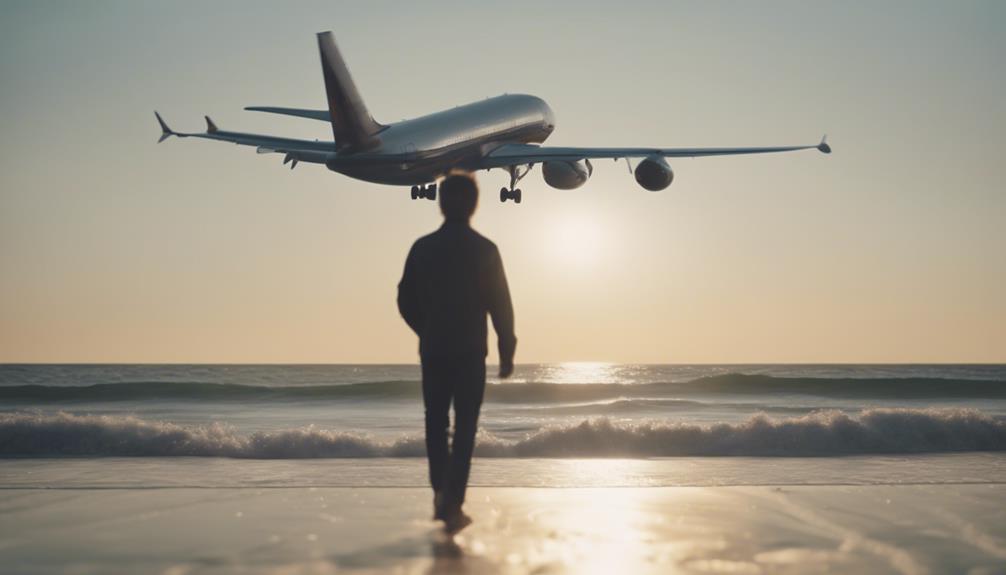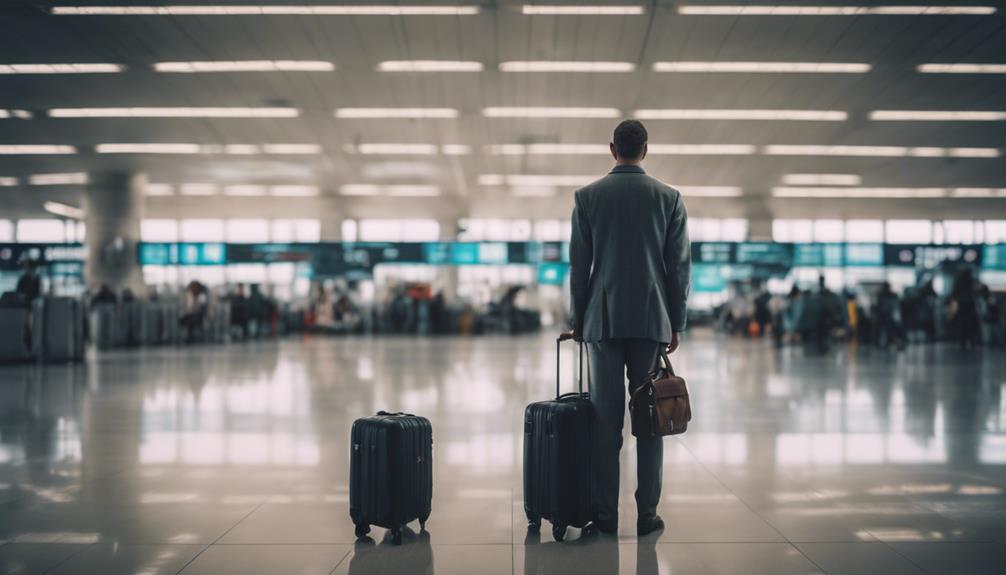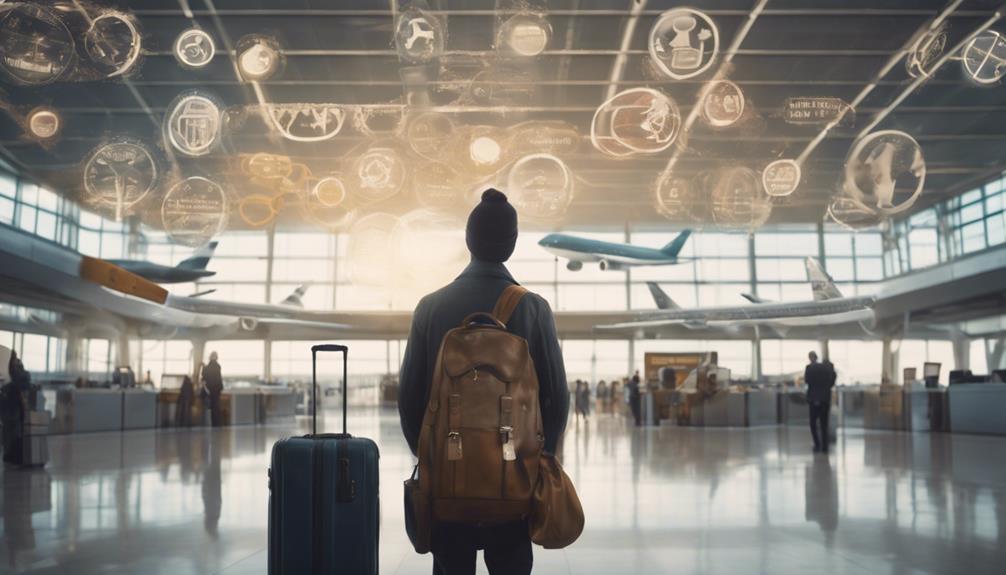
Travel phobias can be effectively addressed and overcome through therapeutic techniques like hypnosis, EFT, and NLP. Hypnosis promotes relaxation, reprograms negative thoughts, and instills confidence for traveling. EFT combines acupressure and psychology to release emotional blockages and empower individuals. NLP targets root causes of fear, focuses on fear management, and enhances coping mechanisms. These methods offer individuals a path to resolve and find freedom from the fear associated with traveling. Further exploration into these techniques can provide deeper insights and strategies for managing travel phobias effectively.
Understanding Travel Phobias
An in-depth examination of the underlying causes and manifestations of travel phobias reveals the complex interplay of psychological and emotional factors that contribute to individuals' fear of traveling.
Travel triggers, such as previous negative experiences during travel, fear of the unknown, fear of loss of control, or fear of enclosed spaces, can activate a person's anxiety and lead to a full-blown phobia.
Fear factors, including fear of flying, fear of getting lost, fear of being in unfamiliar environments, or fear of experiencing a panic attack while away from home, can intensify travel phobias and create significant distress for those affected.
These phobias can stem from past traumas, learned behaviors, or underlying mental health conditions, making them a complex and challenging issue to overcome.
Understanding the specific travel triggers and fear factors that contribute to an individual's travel phobia is essential in developing effective interventions to help them manage and eventually conquer their fears.
Benefits of Hypnosis for Travel Anxiety

Hypnosis offers a unique approach to tackling travel anxiety by promoting deep relaxation and calmness.
By engaging with the subconscious mind, hypnosis can help individuals overcome their fears and anxieties related to traveling.
This powerful tool can assist in reprogramming negative thought patterns and instilling a sense of confidence and ease when starting on journeys.
Hypnosis for Relaxation
Travel anxiety can be effectively alleviated through the powerful relaxation benefits offered by hypnosis. Hypnosis for relaxation involves guiding individuals into a state of deep calmness, allowing them to release tension and anxiety.
By using relaxation techniques during hypnosis sessions, individuals can experience profound stress relief, which is essential for managing travel anxiety. Hypnosis helps reframe negative thought patterns and promotes a sense of inner peace and control.
Through this process, individuals can develop a heightened sense of relaxation and learn to respond to travel-related stressors in a more composed manner. The practice of hypnosis for relaxation not only addresses immediate travel fears but also equips individuals with valuable tools to manage anxiety in various aspects of their lives.
Overcoming Travel Fears
Effectively addressing and conquering travel fears can profoundly enhance one's sense of control and confidence in maneuvering the complexities of the journey.
By utilizing techniques like hypnosis, individuals can develop travel confidence and improve fear management. Hypnosis helps individuals access their subconscious mind to reframe negative thought patterns associated with travel anxiety. Through this process, deep-seated fears can be addressed, allowing travelers to approach their journeys with a newfound sense of assurance and calm.
Hypnosis enables individuals to visualize successful and peaceful travel experiences, empowering them to confront their fears proactively. By incorporating hypnosis into their fear management strategies, individuals can build resilience, reduce anxiety levels, and ultimately enjoy travel experiences with greater ease and confidence.
Exploring EFT Techniques

When delving into the domain of EFT techniques for addressing travel fear, it is essential to understand the underlying principles that guide this approach towards emotional healing. EFT, or Emotional Freedom Technique, is a form of tapping therapy that combines ancient Chinese acupressure and modern psychology. By tapping on specific meridian points on the body while focusing on the negative emotion or fear, EFT aims to release emotional blockages and restore balance to the body's energy system.
The process of tapping in EFT helps individuals acknowledge and accept their fears while simultaneously working towards resolving them. This technique provides a structured way to address emotional distress related to travel fears by targeting the root cause of these anxieties. Through the repetitive tapping sequence, individuals can experience an emotional release, allowing them to reframe their thoughts and emotions associated with travel. EFT techniques empower individuals to take control of their emotions, offering a practical tool for managing and overcoming travel fears.
NLP Strategies for Fear Resolution

In the domain of fear resolution, NLP (Neuro-Linguistic Programming) offers potent strategies that can help individuals overcome their travel fears.
By utilizing techniques like fear elimination and NLP anchoring, individuals can reprogram their thought patterns and responses to fear triggers.
These strategies aim to empower individuals to navigate their fears and anxieties with a renewed sense of confidence and control.
Fear Elimination Techniques
Utilizing Neuro-Linguistic Programming (NLP) strategies offers a structured approach to addressing and overcoming fears through targeted interventions and cognitive reframing techniques.
NLP focuses on fear management by identifying the root cause of the anxiety and implementing strategies to reduce its impact on an individual's thought patterns and behaviors.
By utilizing NLP techniques, individuals can learn to reframe their fears, change their internal dialogue, and create new associations with past triggers.
This process enables individuals to develop a more positive and empowering mindset when faced with their fears, ultimately leading to a reduction in anxiety levels.
Through NLP, individuals can enhance their emotional resilience and develop effective coping mechanisms to eliminate the fear and phobias that hinder their travel experiences.
NLP Anchoring for Fear
NLP anchoring techniques provide a structured framework for individuals to reframe and effectively manage their fears, facilitating a transformation in mindset and emotional response. By employing these fear resolution strategies, individuals can learn to anchor positive emotions to specific triggers associated with their fears. This process can help in breaking the automatic fear response and replacing it with a more empowering emotional state.
Some key aspects of NLP anchoring for fear resolution include:
- Creating a safe mental space for exploring triggers and responses
- Identifying and reframing limiting beliefs associated with fear
- Establishing new neural pathways for positive associations
- Practicing visualization exercises to reinforce positive emotions
- Using anchor triggers in real-life scenarios to manage fear responses
Unpacking the Mind-Body Connection

Exploring the intricate relationship between the mind and body reveals a profound interconnectedness that influences our experiences, emotions, and behaviors. The mind-body connection is a powerful phenomenon that underscores the integration of our mental and physical states. When addressing fears or phobias related to travel, understanding this connection becomes essential for emotional healing. Emotional wounds and anxieties often manifest physically, leading to stress, tension, and even physical symptoms. By delving into the mind-body connection, individuals can start unraveling the root causes of their fears and anxieties surrounding travel.
Emotional healing, in the context of the mind-body connection, involves recognizing how our thoughts and emotions impact our physical well-being. Techniques like hypnosis, EFT, and NLP can aid in this process by helping individuals reframe negative thought patterns, release emotional blockages, and foster a more harmonious relationship between the mind and body. By addressing underlying emotional issues through these modalities, individuals can pave the way for a more positive and empowered outlook on travel experiences.
Overcoming Past Traumas With Hypnosis

Addressing past traumas through hypnosis can be a powerful tool in healing deep emotional wounds. Techniques such as trauma healing and hypnosis for phobias offer individuals a safe space to confront and process their past experiences.
Trauma Healing Techniques
When seeking to overcome past traumas with hypnosis, individuals often find solace and healing through the power of their subconscious mind. This approach allows for a deep exploration of the root causes of trauma and facilitates emotional release, paving the way for healing journeys. Some effective trauma healing techniques include:
- Regression therapy to revisit and reprocess traumatic events.
- Inner child work to address unresolved childhood wounds.
- EMDR (Eye Movement Desensitization and Reprocessing) for trauma processing.
- Somatic experiencing to release trauma stored in the body.
- Parts therapy to integrate different aspects of oneself affected by the trauma.
These techniques, guided by skilled practitioners, can help individuals navigate their traumas and move towards healing and recovery.
Hypnosis for Phobias
Utilizing hypnosis as a therapeutic tool offers individuals a profound avenue for overcoming phobias rooted in past traumas. Phobia management through hypnosis involves delving into the subconscious mind to identify the root cause of the fear, allowing individuals to process and reframe past traumatic experiences.
By accessing the subconscious mind in a relaxed state, hypnosis enables individuals to confront their phobias in a safe and controlled environment, leading to gradual desensitization and eventual resolution of the fear response. This process can also provide anxiety relief by rewiring negative thought patterns and promoting relaxation.
Through targeted suggestions and imagery, hypnosis can empower individuals to reframe their perceptions, build resilience, and ultimately overcome debilitating phobias.
EFT Tapping Points for Calming

To achieve a state of calmness using Emotional Freedom Technique (EFT), it is important to understand and utilize specific tapping points on the body. EFT involves tapping on these points while focusing on the issue at hand to promote emotional release and restore balance.
Here are five key tapping points for calming:
- Top of the Head (TH): This point is believed to help in relaxing and calming the mind.
- Eyebrow (EB): Tapping here can release tension and promote a sense of peace.
- Side of the Eye (SE): This point is associated with reducing stress and anxiety levels.
- Under the Eye (UE): Tapping here may help in letting go of negative emotions and promoting relaxation.
- Collarbone (CB): Stimulating this point is thought to relieve feelings of fear and promote a sense of security.
Rewiring Negative Thought Patterns

Negative thought patterns can be rewired through conscious awareness and targeted interventions that promote cognitive restructuring. These patterns often stem from deep-rooted beliefs or past experiences that influence how we perceive and react to situations. Cognitive restructuring involves challenging and reframing these negative thoughts into more balanced and realistic ones. By identifying irrational beliefs and replacing them with rational alternatives, individuals can gradually shift their mindset towards a more positive outlook.
Negative thought patterns can lead to heightened anxiety, fear, and avoidance behaviors, making it challenging to confront and overcome travel phobias. Through cognitive restructuring techniques, individuals can learn to recognize distorted thinking patterns and replace them with healthier perspectives. This process requires practice and patience but can ultimately lead to a significant reduction in fear and anxiety related to travel.
Visualization Techniques in NLP

Incorporating visualization techniques in Neuro-Linguistic Programming (NLP) offers a potent method for harnessing the mind's potential to create positive change and overcome obstacles. Through the use of mental imagery and techniques grounded in NLP principles, individuals can reframe their perceptions and beliefs, leading to a more positive outlook on travel experiences.
Here are five key benefits of incorporating visualization techniques in NLP:
- Enhanced Focus: Visualization exercises help individuals sharpen their focus and concentration, enabling them to visualize their desired travel outcomes with clarity.
- Emotional Regulation: NLP techniques combined with mental imagery allow individuals to manage and regulate their emotions effectively, reducing anxiety and fear associated with travel.
- Improved Confidence: Visualization in NLP empowers individuals to visualize themselves handling travel situations confidently and successfully, boosting self-assurance.
- Behavioral Repatterning: By visualizing positive travel scenarios, individuals can reprogram their subconscious mind, replacing limiting beliefs with empowering ones.
- Stress Reduction: Engaging in visualization practices as part of NLP can notably reduce stress levels, promoting a sense of calm and readiness for travel adventures.
Creating a Positive Travel Mindset

Fostering a positive mindset towards travel involves cultivating a mindset of anticipation and openness to new experiences. Embracing a positive outlook can have a considerable impact on one's travel experience, making it more enjoyable and fulfilling. A positive mindset enables travelers to approach unfamiliar situations with curiosity rather than fear, allowing for personal growth and discovery. It can help alleviate travel-related stress and anxiety, promoting relaxation throughout the journey.
To cultivate a positive travel mindset, individuals can engage in practices such as mindfulness, visualization, and gratitude. Mindfulness techniques can help travelers stay present and focused, appreciating each moment of the journey. Visualization exercises can aid in creating a mental image of a successful and enjoyable trip, reinforcing positive expectations. Expressing gratitude for the opportunity to travel and for the experiences encountered along the way can further enhance the overall travel relaxation.
Frequently Asked Questions
Can Hypnosis, Eft, and NLP Be Used Together to Address Travel Phobias More Effectively?
Alternative therapies offer effective anxiety management tools. When utilized together, hypnosis, EFT, and NLP can thoroughly address travel phobias. These techniques, when combined, provide a holistic approach to target and alleviate the root causes of fear and anxiety.
How Long Does It Typically Take to See Results When Using Hypnosis for Travel Anxiety?
Achieving resolution for travel anxiety varies, with hypnosis effectiveness often seen in a few sessions, but individual timelines differ. Techniques tailored to address specific fears can expedite results. Patience and consistent practice are key.
Are There Specific EFT Techniques That Are More Effective for Dealing With Travel Fears?
Employing specific EFT tapping methods and visualization techniques can enhance the efficacy of addressing travel fears. Utilizing relaxation practices and affirmations may further support individuals in managing their anxieties, fostering a sense of empowerment and calmness.
How Can NLP Help in Resolving Deep-Seated Fears Related to Travel?
Resolving deep-seated fears related to travel involves understanding the mind-body connection and subconscious patterns. Cognitive restructuring and visualization techniques in NLP can help uncover and address underlying fears, leading to effective long-term solutions for travelers.
Are There Any Potential Risks or Side Effects Associated With Using Hypnosis, Eft, or NLP for Overcoming Travel Phobias?
When considering potential risks and side effects associated with interventions, it is important to address safety concerns and take necessary precautions. Understanding these aspects can help individuals make informed decisions regarding their well-being and treatment options.
Conclusion
To sum up, the integration of hypnosis, EFT, and NLP can effectively address travel phobias by targeting the root causes of fear and anxiety.
By tapping into the mind-body connection, rewiring negative thought patterns, and utilizing visualization techniques, individuals can cultivate a positive mindset towards travel.
Imagine a future where fear no longer holds you back from exploring new destinations and experiencing the joys of travel with ease and confidence.
Take the Next Step
Do not be afraid to reach out to me, Mark E Wilkins, to assist you in any issues you might have. Most Hypnotherapy sessions last 2 hours and EFT Sessions are usually handled with one session. Life Coaching is 45 minute session, once a week. Self-Hypnosis is taught in one session, and lasts a lifetime.
To make an appointment, first listen to the Pre-talk and fill out he Complementary Healthcare Provider Disclosure. The use the Contact Form to request an appointment with the Bohol Hypnosis Expert.
Self-help downloads are available. The self-hypnosis program to teach you how to self-hypnotize is here.





